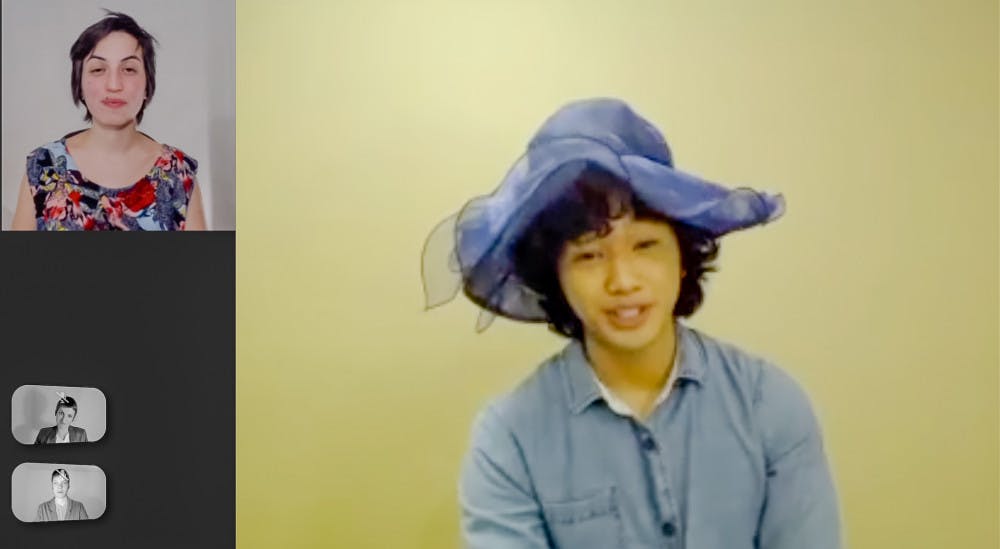“Left and Right, or Being who/where you are,” a performance presented by the Brown Arts Initiative, held five shows last week, all of which sold out. The series of virtual performances began Feb. 10 and concluded Feb. 14.
The performance featured both human actors and digital bots to demonstrate the different political identities that lead to partisan divisiveness on both a national and international scale.
The show featured “video calls” between friends, who shared their different opinions on the politicized nature of topics like the COVID-19 pandemic. The characters even roleplayed as different “archetypes” to educate the audience on the broad range of the political spectrum. To enhance the educational aspect of the performance, the audience had the ability to interact directly with other audience members, the actors and bots through a virtual chat.
The shows commenced at 7 p.m. during the week and 12 p.m. over the weekend to accommodate an international audience. The show initially offered 25 tickets per performance, but due to high demand, the weekend performances added an additional 25 seats per show. Admission was free of charge and open to the public, according to the production’s website.
The show utilized the interactive platform “OhYay.Co,” which allowed the actors to layer their videos, move themselves around the virtual “stage,” speak directly to audience members and transition to different “rooms.”
While the interactive platform posed its own challenges, such as delays and a learning curve for performers, it allowed audience members and actors worldwide to participate, said Madeline Greenberg ’21, the performances’s production manager.
“We had actors from all over the world. We had some actors performing at 2 a.m,” Greenberg said. “One of the pros of virtual theater is that we are able to work with actors who are in Romania. It is impossible to get (all of these actors) all together to do the show in any other time period than right now,” she added.
The cast was composed of Marcela Mancino, who played a Brazilian woman called Maite, Patrick Elizalde ’20, who played a Boston man called Sean and Andra Jurj and Fabiola Petri, who both simultaneously played a Romanian woman, Mara. The characters are friends with different political archetypes, which are teased out in their conversations.
Maite, who represented a “left-leaning” political archetype frequently argued with Sean, who represented a “right-leaning” archetype. These arguments ranged from COVID-19 quarantine restrictions to climate change.
In their performance as Mara, a representative of the “exhaustive majority,” Jurj and Petri shared similar commentary at once in response to these polarizing conversations.
The show also featured in-chat bots Kimberly and Nick, who served as characters in Sean and Maite’s “chat box roulette game.” These bots, who were expressly programmed to talk about politics, interacted with the audience during the performance through the virtual chat function.
During a conversation about COVID-19 with Sean and Maite, Nick wrote: “Covid-19 may only be the beginning of global pandemics — a future scenario in which climate change may play a role.”
“The media are hard at work weaving a web of confusion, misinformation and conspiracy surrounding the Chinese coronavirus pandemic,” Kimberly wrote in response.
Beyond its virtual acting and chat interactions, the performance also featured interpretative dancing and singing.
Prior to the performance, audience members were asked to fill out a quiz to discover their own political ideology, which determined their “seat” in the audience. Each virtual “seat” was indicated by a dot underneath the ideology that matched each audience member’s quiz results. This also allowed audience members to figure out which character they aligned with most.
This performance was a continuation of the political research of Emerson Assistant Professor at the Marlboro Institute for Liberal Arts and Interdisciplinary Studies Dr. Ioana B. Jucan ’11 MA ’13 MA ’15 PhD ’18. Jucan was approached by the Brown Arts Initiative to put on a show before the pandemic, and she decided to reshape it into an online format throughout quarantine.
“We spent the summer of 2020 doing a lot of research into what has been done in this space and then coming up with ideas,” Jucan said. “I wanted to create an interactive performance, and that is where we started.”
Jucan began casting the show in the fall. From then until early January, the performers worked on their improvisation in character. By the end of the month, the show had gone through many rounds of edits and staging, before being finalized.
“I’m excited about how it came together. There were a lot of technological challenges, and doing an online trans-atlantic performance is very unpredictable,” Jucan said. “You are so fully reliant on technology and that has not been the case in any of the other performances I have done.”
The show will be performed again on Mar. 13 as part of ReFest 2021, an annual arts and technology festival organized by Culture Hub.

Rebecca Carcieri is an arts & culture editor. She is a senior from Warwick, Rhode Island studying political science.





